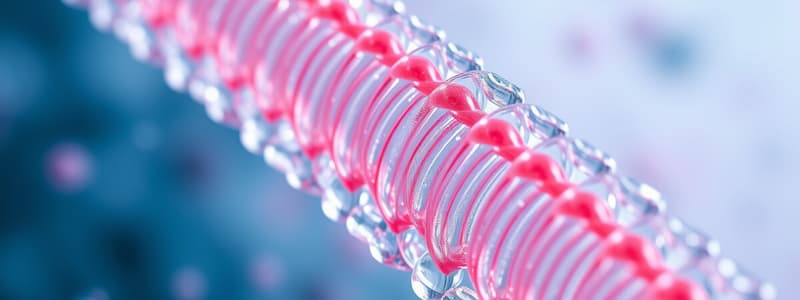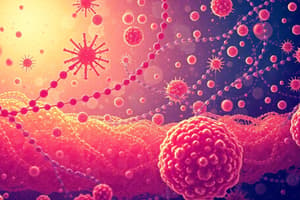Podcast
Questions and Answers
What does selectively permeable mean?
What does selectively permeable mean?
- Blocks all ions from passing
- Completely impermeable to all substances
- Allows certain molecules to pass through (correct)
- Only liquid substances can pass
What is a peripheral protein?
What is a peripheral protein?
Proteins that adhere only temporarily to the biological membrane.
What is an integral protein?
What is an integral protein?
A protein molecule that is permanently attached to the biological membrane.
Define diffusion.
Define diffusion.
What is osmosis?
What is osmosis?
What does hypotonic mean?
What does hypotonic mean?
What does hypertonic mean?
What does hypertonic mean?
What does isotonic mean?
What does isotonic mean?
Define passive transport.
Define passive transport.
What is active transport?
What is active transport?
What is endocytosis?
What is endocytosis?
Define exocytosis.
Define exocytosis.
What is facilitated diffusion?
What is facilitated diffusion?
Define turgor pressure.
Define turgor pressure.
What is cytolysis?
What is cytolysis?
Define equilibrium.
Define equilibrium.
Flashcards are hidden until you start studying
Study Notes
Membranes and Transport Mechanisms
- Selectively Permeable Membrane: Allows specific molecules or ions to diffuse through, enabling controlled entry and exit of substances.
- Peripheral Protein: Temporarily adheres to the membrane, playing roles in signaling or attachment but not firmly fixed.
- Integral Protein: Permanently embedded in the membrane, essential for transport and communication across the membrane.
Diffusion and Osmosis
- Diffusion: Process where particles spread from areas of higher concentration to lower concentration, promoting equilibrium.
- Osmosis: Specific type of diffusion for solvents through a semipermeable membrane from a less concentrated to a more concentrated solution to balance concentrations.
Types of Solutions
- Hypotonic: Solutions with lower solute concentration than another solution, leading to potential cell swelling.
- Hypertonic: Solutions with higher solute concentration than another solution, causing cell shrinkage.
- Isotonic: Solutions with equal solute concentration, resulting in no net movement of water across the membrane, maintaining cell size.
Transport Processes
- Passive Transport: Movement of substances across a membrane without energy expenditure; driven by concentration gradients.
- Active Transport: Movement of molecules against their concentration gradient, requiring energy and typically aided by enzymes.
Endocytosis and Exocytosis
- Endocytosis: Cellular process of taking in matter through membrane invagination to form a vacuole, facilitating nutrient uptake.
- Exocytosis: Release of substances from a cell via vacuole fusion with the cell membrane, enabling secretion of waste or signaling molecules.
Specialized Transport
- Facilitated Diffusion: A type of passive transport aided by integral proteins that increases the membrane's permeability for specific molecules.
Cell Integrity and Function
- Turgor Pressure: Internal pressure against the plant cell wall, maintaining shape and structure; crucial for plant rigidity.
- Cytolysis: Process where cells are disrupted or dissolved, often due to osmotic imbalance and resulting in cell bursting.
- Equilibrium: State where opposing forces are balanced; important in biological systems for maintaining homeostasis.
Studying That Suits You
Use AI to generate personalized quizzes and flashcards to suit your learning preferences.




